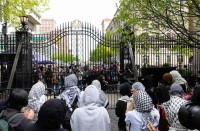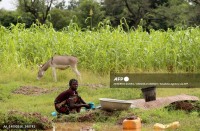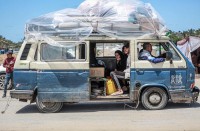by Maria Isabel SANCHEZ
Agence France Presse
CARACAS, Venezuela (AFP) — The clock ticked down Sunday on a deadline for Venezuela’s beleaguered leader Nicolas Maduro to call snap presidential elections or see his opposition rival Juan Guaido recognized as interim president by European powers.
Guaido, already recognized by the United States, Canada, Australia and several Latin American countries, said Sunday he would lobby the European Union for badly-needed humanitarian aid to a nation wracked by economic crisis.
“We are going to exercise our powers to deal with the crisis, restore democracy and achieve freedom,” the 35-year-old National Assembly leader said on Twitter.
Guaido was also expected to announce a date for the arrival of humanitarian aid from the US — a path President Maduro believes will lead to a US-led military intervention.
In Washington, US President Donald Trump warned that military intervention remains “an option” for dealing with the crisis in oil-rich but impoverished Venezuela.
Maduro addressed troops on military exercises in Venezuela’s coastal northeast Sunday, calling on them for “maximum cohesion” a day after a top Air Force general publicly sided with Guaido.
The opposition “want to deliver the country in pieces to the gringo empire and the local oligarchies,” Maduro told the soldiers.
Deadline looming
The US recognized Guaido as Venezuela’s interim president on January 23 while seven European nations, including Britain, France, Germany and Spain, have said they will do likewise unless Maduro calls presidential elections.
Austria was the latest to join the group. Foreign Minister Sebastian Kurz announced the decision to back the ultimatum in a tweet on Sunday.
France warned Maduro of the approaching deadline and that it was preparing to recognize Guaido.
“The ultimatum ends tonight,” France’s European Affairs Minister Nathalie Loiseau told French media on Sunday.
“If between now and this evening Mr Maduro does not commit to organizing presidential elections, we will consider that Mr Guaido is legitimate to organize them in his place,” Loiseau added.
‘Let’s have elections’
Tens of thousands of people turned out Saturday for competing shows of support for Guaido, who stunned the world 10 days ago by declaring himself “acting president,” and for Maduro who was sworn in January 10 to a disputed second six-year term.
During the protest, Guaido announced the installation of collection centers for medicine and food — items lacking in Venezuela — in neighboring Colombia and Brazil.
“Answering the call of President Guaido, the US is mobilizing & transporting humanitarian aid for the people of Venezuela,” US National Security Advisor John Bolton said on Twitter.
Speaking at a pro-regime demonstration marking 20 years since his predecessor Hugo Chavez came to power, Maduro ignored international demands for a new ballot and instead reiterated his call to bring forward legislative elections slated for the end of 2020 to this year.
“They want to bring forward elections, let’s have elections,” he said.
Loiseau, the French minister, dismissed Maduro’s threat to hold early legislative polls as “a tragic farce.”
Maduro, making his first appearance at a rally since a military parade in August when he claimed to have been targeted in an attempted assassination, accused Guaido of being a US “puppet” in a coup d’etat attempt.
Under Maduro’s stewardship, oil-dependent Venezuela has lurched into an economic crisis that has left the country suffering from hyperinflation and shortages of food and medicine.
But he refuses to let aid into the country. At his rally on Saturday, he called the opposition “imperialist beggars,” claiming a US pledge to deliver $20 million in aid would precede military intervention.
‘Decisive’
Guaido also called for a new demonstration on February 12, and another protest to push for the entry of aid.
Speaking at the European Union’s headquarters in the east of the capital, he said this month “should be decisive.”
All eyes are on the military, which has so far been Maduro’s main pillar of support, but there have been signs of unrest in the ranks.
On January 21, a group of 27 soldiers rose up against Maduro in Caracas. Although that was quickly suppressed, it helped spark a week of protests in which 40 people were killed in clashes with security forces, with hundreds more arrested, according to the United Nations.
European and Latin American states have formed a “Contact Group” giving themselves 90 days to resolve the crisis. They will meet in the Uruguayan capital Montevideo next Thursday, the EU said.
Guaido moved to expand his international support by reassuring China — Venezuela’s main creditor and a long-time ally of the socialist regime — that he would honor bilateral agreements if successful in ousting Maduro.
Another key ally, Russia, hit out Sunday against “destructive outside interference” in Venezuela’s problems.
© Agence France-Presse







